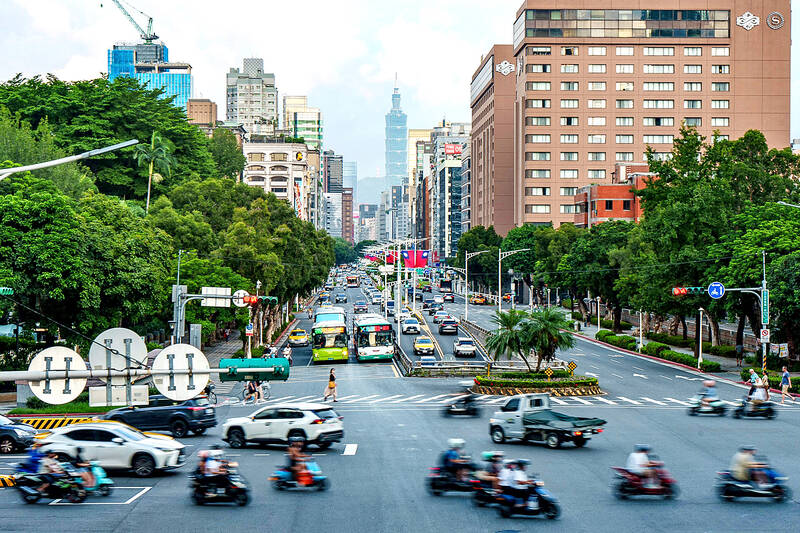Taiwan’s consumer confidence index (CCI) this month edged up 0.09 points from last month to 77.84, gaining for five months and hitting the highest level since March 2020, a survey conducted by the National Central University (NCU) showed on Friday.
Of the six component measures, the readings on the economic outlook, household income, consumer prices, the job market and purchases of durable goods all picked up, in line with positive economic data, NCU Economic Research Center director Dachrahn Wu (吳大任) said.
Investment sentiment in the local stock market turned out to be the only sub-index with a downtrend, as the TAIEX moved sideways earlier this month, before the US Federal Reserve cut interest rates by 50 basis points on Sept. 18.

Photo: AFP
Wu said overall confidence was mainly driven by stable demand in the domestic market as well as wage hikes in some industries facing labor shortages.
The NCU surveyed 3,142 adults aged 20 and above by telephone between Sept. 18 and 21, it said.
The survey showed little change in home-buying intentions, despite the central bank introducing mortgage restrictions on Sept. 19 to curb real-estate speculation.
The real-estate purchase index, which was compiled by NCU along with Taiwan Realty Co (台灣房屋), rose 0.4 points this month from the previous month.
Taiwanese would need to provide a downpayment of 50 percent to 70 percent when buying homes if they already own real estate, even if that ownership is partial or fragmented as a result of inheritance, the central bank said.
People with real demand might feel more comfortable buying homes as house investors and speculators fled the market, making house prices more reasonable, Wu said.
It is better to wait a while longer before passing judgement on the matter, he said.

Zhang Yazhou was sitting in the passenger seat of her Tesla Model 3 when she said she heard her father’s panicked voice: The brakes do not work. Approaching a red light, her father swerved around two cars before plowing into a sport utility vehicle and a sedan, and crashing into a large concrete barrier. Stunned, Zhang gazed at the deflating airbag in front of her. She could never have imagined what was to come: Tesla Inc sued her for defamation for complaining publicly about the vehicles brakes — and won. A Chinese court ordered Zhang to pay more than US$23,000 in

Taiwan Semiconductor Manufacturing Co (TSMC, 台積電) yesterday said that its investment plan in Arizona is going according to schedule, following a local media report claiming that the company is planning to break ground on its third wafer fab in the US in June. In a statement, TSMC said it does not comment on market speculation, but that its investments in Arizona are proceeding well. TSMC is investing more than US$65 billion in Arizona to build three advanced wafer fabs. The first one has started production using the 4-nanometer (nm) process, while the second one would start mass production using the

A TAIWAN DEAL: TSMC is in early talks to fully operate Intel’s US semiconductor factories in a deal first raised by Trump officials, but Intel’s interest is uncertain Broadcom Inc has had informal talks with its advisers about making a bid for Intel Corp’s chip-design and marketing business, the Wall Street Journal reported, citing people familiar with the matter. Nothing has been submitted to Intel and Broadcom could decide not to pursue a deal, according to the Journal. Bloomberg News earlier reported that Taiwan Semiconductor Manufacturing Co (TSMC, 台積電) is in early talks for a controlling stake in Intel’s factories at the request of officials at US President Donald Trump’s administration, as the president looks to boost US manufacturing and maintain the country’s leadership in critical technologies. Trump officials raised the

From George Clooney to LeBron James, celebrities in the US have cashed in on tequila’s soaring popularity, but in Mexico, producers of the agave plant used to make the country’s most famous liquor are nursing a nasty hangover. Instead of bringing a long period of prosperity for farmers of the spiky succulent, the tequila boom has created a supply glut that sent agave prices slumping. Mexican tequila exports surged from 224 million liters in 2018 to a record 402 million last year, according to the Tequila Regulatory Council, which oversees qualification for the internationally recognized denomination of origin label. The US, Germany, Spain,